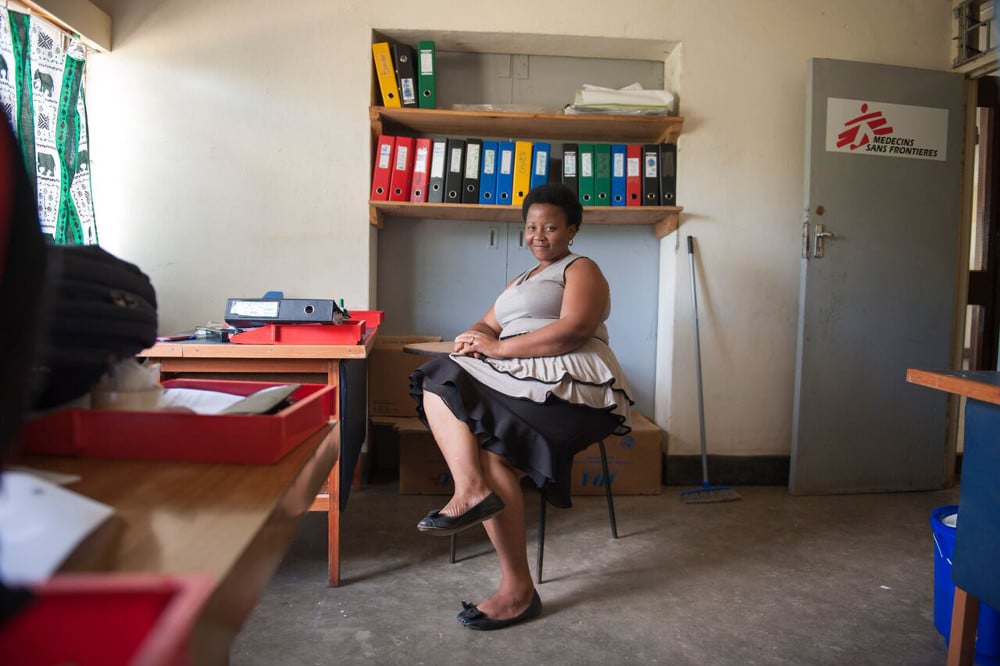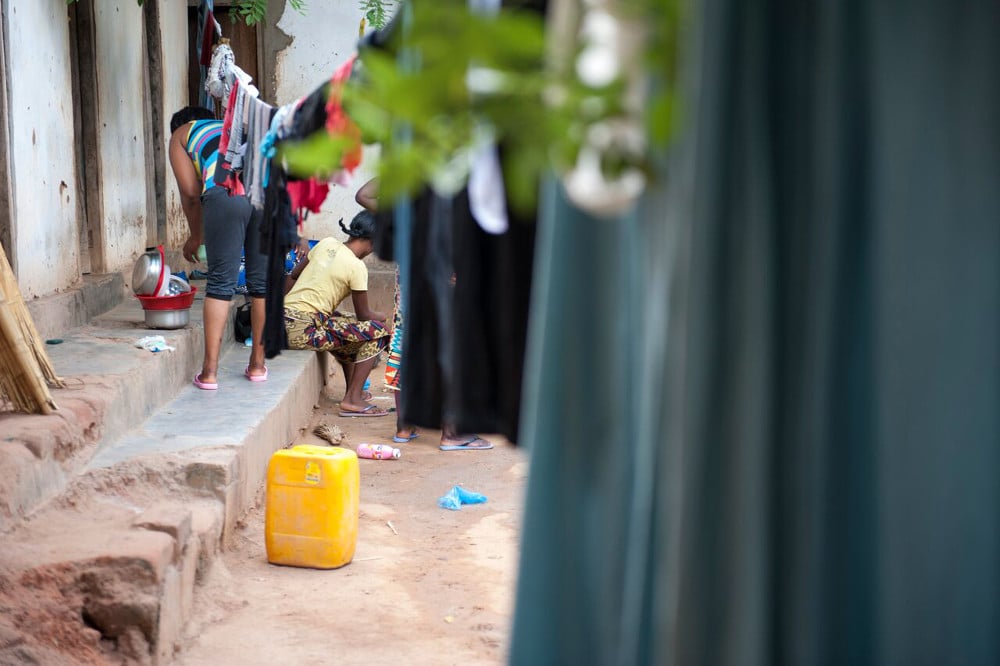Desperation: Poverty drives Malawi sex workers
“God bless you mum” read the words on a piece of material with the picture of a woman with a baby on her back and a clay pot on her head. The fabric is stretched over an open window where a group of women dotes over a baby girl.
The women’s laughter is barely audible over the loud music coming from the bar on the other side of a crude log fence. Inside the room, a middle-aged woman sits on a reed mat with her legs stretched out in front of her, leaning back against a stained white wall.
The three rooms at the back of this busy bar on the Malawian side of the border with Mozambique are a brothel owned by Eliza Piri* and her sisters.
“In January when we opened this business, people from Doctors Without Borders [MSF] came over and spoke to us about how to conduct our business more safely,” says Piri.
A rude awakening
Initially the 40-year-old, who has been a sex worker for 20 years, was not paying attention to the workers from MSF. “I was thinking: ‘I have been doing sex work for many years and now they were coming here and telling us how to conduct our business.'”
But when they started listing some of the symptoms of sexually transmitted infections, she got worried.
“I realised that I was experiencing some of those symptoms. I was menstruating for several weeks by then,” she recalls. “The following day I went to the MSF office at Mwanza hospital and told them what was happening.”
Piri was referred to a doctor at the hospital and was later diagnosed with cervical cancer.
Caused by the human papillomavirus, which is mainly transmitted through sex, cervical cancer is the second most common cancer in women living in less developed regions, according to the World Health Organisation.
“Luckily they caught it early so she was able to get treatment and now she’s fine,” says Bertha Nyerenda, the MSF worker who helped her.
Adds Piri: “Most of us [sex workers] actually don’t feel encouraged to go to clinics and hospitals. But because they come to us, we are able to get services we didn’t have access to before like HIV testing.”
Network of care
The MSF office in Mwanza, where Nyerenda is based, is part of a project in which clinics provide healthcare along a busy trade route that is used to transport goods throughout Southern Africa.
The route is frequented by truck drivers who often have to stay overnight at the truck stops; this provides plenty of work for sex workers. The project operates in border towns between Malawi and Mozambique and recently expanded to Zimbabwe.
According to a government report, there are an estimated 15 000 female sex workers in Malawi. This is a fraction of the country’s population of more than 16‑million people. Sex work is illegal in Malawi.
The services are tailored for the specific healthcare needs of marginalised people, such as sex workers and migrant workers, who are at a higher risk of HIV infection than the general population.
 Bertha Nyeranda counsels sex workers in Mwanza about HIV and STIs.
Bertha Nyeranda counsels sex workers in Mwanza about HIV and STIs.
Caring for the most vulnerable populations
“Sex workers require our services because they have multiple sexual partners. This puts them at high risk of HIV infection but they are often discriminated against when they try to access health services,” says Nyerenda.
She provides sex workers with sexual and reproductive health education, including HIV counselling and testing. She also makes sure her clients can get hold of long-term contraception, as well as treatment for tuberculosis and sexually transmitted infections, at a state clinic or hospital.
She explains: “We don’t treat the sex workers for illnesses, but we give them an entry point into the healthcare system.”
A long way from home
A few kilometres down the main road from Piri’s business, Melina Alan (not her real name) sits on a wooden bench in the courtyard of the compound she shares with her friends and colleagues. The daughter of a church leader, she is a long way from home – 100km, to be precise.
“My mother doesn’t know what I’m doing here. When I left home I simply told her that I got a job in Mwanza,” the 23-year-old explains, fiddling with the cellphone in her hands.
Alan says she was forced into sex work last year when her relationship with the father of the youngest of her three children broke down.
“I don’t do this because I enjoy it; I do sex work out of desperation,” she says. “My father passed away a long time ago so I have to take care of my mother and my children. Without my boyfriend’s help, this is the only way I can take care of my family.”
It is lunchtime and several women sit in their doorways, squatting over makeshift braziers, stirring pots and speaking loudly over the banging music coming from beyond the compound walls.
Making ends meet
“These women are from different places. They came here to work at a bottle store in the area but they end up doing sex work to supplement their income,” explains Nyerenda.
During their regular visits to the compound, MSF staff counsel and test the women, and provide them with free condoms and lubricant.
They recently referred Alan to the hospital to get emergency contraceptives after a condom broke while she was with a client.
A 2013 government survey estimates that more than 60% of female sex workers in Malawi are HIV positive. Alan is now one of them.
“I was very scared when the doctor diagnosed me with HIV. But he told me there is still hope for me to live a normal life and see my children grow up, as long as I take the medication he gave me,” she says.
 Out of desperation, women come to Mwanza in search of opportunities and some turn to sex work to support their families.
Out of desperation, women come to Mwanza in search of opportunities and some turn to sex work to support their families.
Preventing re-infection
Now that Alan is on antiretroviral medication, Nyerenda checks up on her often to make sure that she takes her treatment correctly. Research has shown that HIV-infected people who take their medication consistently are far less likely to transmit the virus than those who are not on treatment – and those who don’t adhere to it.
Nyerenda tries to make sure that Alan continues to use condoms so that she can protect herself against reinfection and also reduce the chance of infecting her clients.
Nyerenda worries about Alan and the other women at the compound. They regularly move between towns for business and she never knows when she will see them next, if at all. “It is difficult to trace some of the sex workers at times because some of them just move without leaving any contact information,” she says.
Making better, safer choices
Back at the Mozambique borderpost, more trucks pull up as the sun sets. Drivers file into the bar in front of Piri’s brothel while the sex workers she employs prepare for the evening’s work.
“After my experience, I keep a close eye on the new girls. If I see that they are doing things carelessly, I sit down with them and give them advice according to what I learned.”
Piri now makes sure that all her employees have enough condoms and lubricant and discourages them from having unprotected sex.
She has even changed the way she conducts her own business as a sex worker. “Before, I would do whatever the client requested. But now I do not have unprotected sex and I have reduced my sexual partners. I only provide services to certain clients.”
* Not her real name.
This article was amended on 18 August 2016 to protect the identities of some sources.